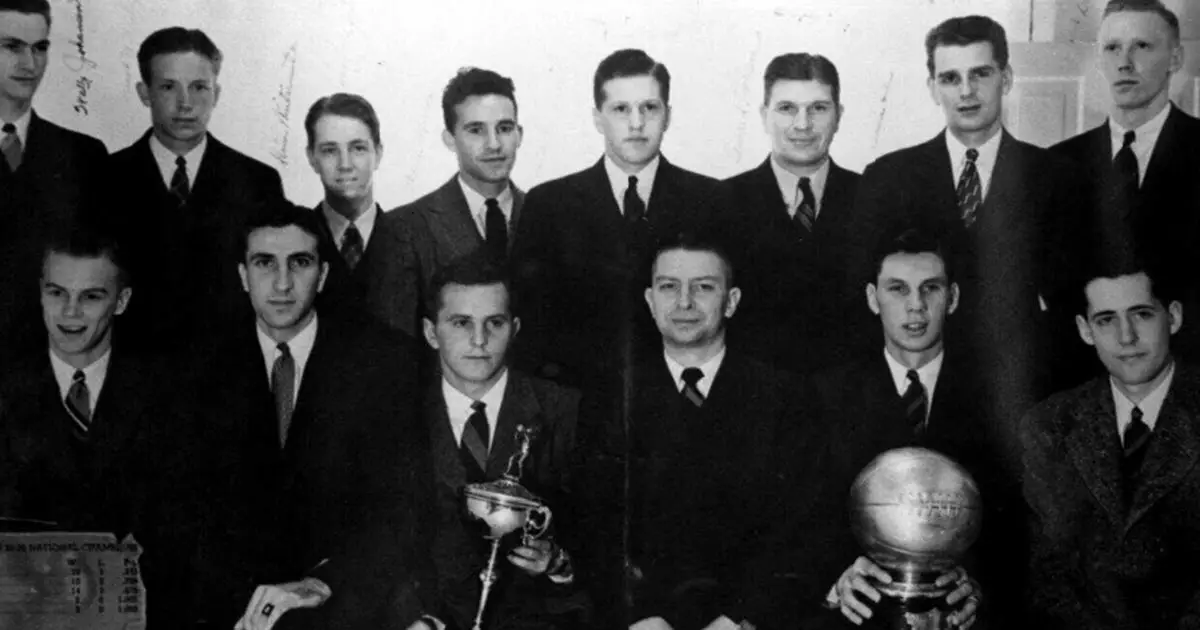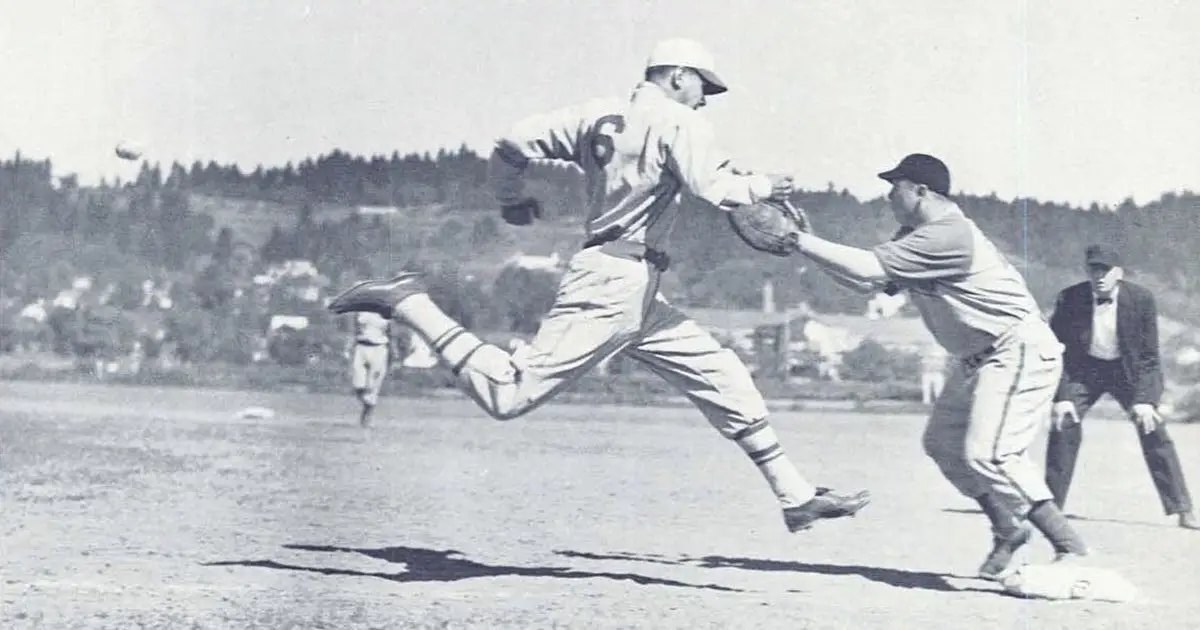Oregon fans know of the “Tall Firs”—winners of the 1939 NCAA National Basketball Championship—by famous players like Admiral John Dick and Tall Firs coach Howard “Hobby” Hobson. Yet few realize that coach Hobson also coached the University’s baseball team, achieving nearly the same level of success that he did with his basketball program.
The Oregon Ducks experienced a golden age in baseball from the mid-1930s to the late 1940s under Coach Hobson’s tutelage, but it was during a very different era in college sports. Among other things, it was routine for players to become coaches at a very early age. For example, Don Kirsch, the Duck player that succeeded Hobson as head coach and perpetuated his success, took the reins at the ripe old age 25. An even bigger difference, as Hobson’s dualistic career exemplifies, is that it was commonplace for coaches to be in charge of more than one sport!

EVERYONE KNOWS OF THE BASKETBALL CHAMPIONS “TALL FIRS” WITH ADMIRAL JOHN DICK (LOWER ROW, FAR RIGHT) AND COACH HOWARD HOBSON (LOWER ROW, FOURTH FROM LEFT).
Back then, there was no college world series, and Oregon competed in the Northern division of the old Pacific Coast Conference, which had no conference championship. Oregon’s scheduled opponents included Idaho, Oregon State, Washington, and Washington State, as well as a number of the smaller colleges and universities in the Northwest.
The golden age of Oregon basketball began with head coach Bill Reinhart, whose 1934 and 1935 teams, led by the legendary Joe Gordon, won the Northern Division. Following the 1935 season, Reinhart left to become George Washington University’s head basketball coach. Who was to replace Reinhart?

Howard Hobson (in dark jacket) coaches the bat selection in 1937.
Oregon selected Hobby Hobson, a Southern Oregon University coach, to succeed Reinhart in 1936. Hobson had actually been a star athlete in his undergraduate days at Oregon, playing forward on the basketball team and the second base on the Ducks’ baseball team.
College sports were high profile in Coach Hobby’s time. To open the 1936 baseball season, the City of Eugene organized a parade that wound through downtown Eugene to the Ducks’ ballpark. The parade included the entire contingent of the R.O.T.C., two marching bands, players from both teams, local officials, and various student-athletes. (No, this was not what Animal House was replicating!) Can you imagine a parade to open a season of any Oregon sport in this day and age?
During Hobson’s coaching reign the Ducks never had a losing season and finished no worse than third in the Northern Division. The Ducks won the Northern Division six times under his guidance in 1937, 1939, 1941, 1942, 1943, and 1946. (Due to World War II there was no baseball team in 1944 and 1945.)

Don Kirsch teaches bunting technique in 1966.
Hobson left Oregon for the head coaching job with Yale’s basketball team following the 1947 season and was replaced by one of his former players, Don Kirsch. Kirsch would wind up leading Oregon to its only appearance in the College World Series in 1954. Coach Kirsch was beloved by his players and played a major role in the continuing success of Oregon baseball.
The golden age of Duck baseball also produced several players who eventually made it to the major leagues, including the aforementioned Joe Gordon, Barney Koch, Ford “Moon” Mullen, Wellington “Wimpy” Quinn, Bill Sayles, and Dick Whitman. (Mullen was also a member of the “Tall Firs” basketball team.) Oregon has never experienced such a long stretch of success on the diamond before or since that time.
As we ponder the projected upcoming changes to PK Park and the new coaching staff-perhaps we will see another golden age of Oregon baseball in the near future?
Jim Maloney
Ellensburg, Washington
Top Photo from UO Yearbook Oregana

Brad Nye, the FishDuck.com Volunteer editor for this article, works for Deschutes Land Trust in Bend, Oregon.
Related Articles:
Jim currently resides in Ellensburg, Washington where he has had the opportunity to watch former Ducks such as NaDerris Ward and Scott Grady play for Central Washington University, Jim’s alma mater. However, Jim was born in Eugene and attended Howard Elementary School, and what then called Colin Kelly Junior High School before moving to Washington. Jim began following the Ducks during the 1957 season and had the opportunity to watch a number of games at Hayward Field. Over the years, Jim has developed a wealth of knowledge about Oregon sports history. When not editing on Fanbase.com or working in his garden, Jim manages to find time to practice law.

